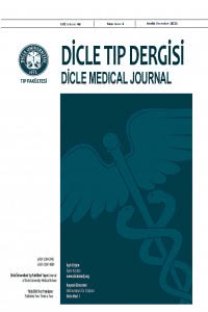Kanser tedavisinde teofilin
Antikarsinojenik ajanlar, Çay, Siklik AMP, Akciğer neoplazmları, Teofilin
Theophylline in the treatment of cancer
Anticarcinogenic Agents, Tea, Cyclic AMP, Lung Neoplasms, Theophylline,
___
- 1. Chung FL. The prevention of lung cancer induced by a tobacco-specific carcinogen in rodents by green and black Tea. Proc Soc Exp Biol Med, 1999; 220: 244-248.
- 2. Shafer SH, Phelps SH, Williams CL. Reduced DNA synthesis and cell viability in small cell lung carcinoma by treatment with cyclic AMP phosphodiesterase inhibitors. Biochem Pharmacol, 1998; 56: 1229-1236.
- 3. Valenzuela MT, Mateos S, Ruiz de Almodovar JM, McMillan TJ. Variation in sensitizing effect of caffeine in human tumour cell lines after gamma-irradiation. Radiother Oncol, 2000; 54: 261-271.
- 4. VanderPloeg LC, Wolfrom DM, Welsch CW. Influence of caffeine on development of benign and carcinomatous mammary gland tumors in female rats treated with the
- carcinogens 7,12-dimethylbenz(a)anthracene and N-methyl-N-nitrosourea. Cancer Res, 1991; 51: 3399-3404.
- 5. Nomura M, Ichimatsu D, Moritani S, et al. Inhibition of epidermal growth factorinduced cell transformation and Akt activation by caffeine. Mol Carcinog, 2005; 44: 67-76.
- 6. Menon LG, Ingle AD, Gude RP. Tumor regression of B16F10 melanoma in vivo by prevention of neovascularization: study on theophylline. Cancer Biother Radiopharm, 2002; 17: 213-217.
- 7. Lentini A, Kleinman HK, Mattioli P, et al. Inhibition of melanoma pulmonary metastasis by methylxanthines due to decreased invasion and proliferation. Melanoma Res, 1998; 8: 131-137.
- 8. Hirsh L, Dantes A, Suh BS, et al. Phosphodiesterase inhibitors as anti-cancer drugs. Biochem Pharmacol, 2004; 68: 981-988.
- 9. Caraglia M, Marra M, Giuberti G, et al. Theophylline-induced apoptosis is paralleled by protein kinase A-dependent tissue transglutaminase activation in cancer cells. J Biochem (Tokyo), 2002; 132: 45-52.
- 10. Slotkin TA, Seidler FJ. Antimitotic and cytotoxic effects of theophylline in MDAMB- 231 human breast cancer cells. Breast Cancer Res Treat, 2000; 64: 259-267.
- 11. Crumpton TL, Seidler FJ, Slotkin TA. Generation of reactive oxygen species by xanthine derivatives in MDA-MB-231 human breast cancer cells. Breast Cancer Res Treat, 2001; 66: 143-146.
- 12. Nowell S, Sweeney C, Hammons G, Kadlubar FF, Lang NP. CYP2A6 activity determined by caffeine phenotyping: association with colorectal cancer risk. Cancer Epidemiol Biomarkers Prev, 2002; 11: 377- 383.
- 13. Merimsky O, Hirsh L, Dantes A, et al. Induction of apoptosis in non-small lung carcinoma cell line (H1299) by combination of anti-asthma drugs with gemcitabine and cisplatin. Int J Oncol, 2005; 26: 475-482.
- 14. Mabed M, Aref S, Fouda M, El- Sharawy S. Chlorambucil plus theophylline vs chlorambucil alone as a front line therapy for B-cell chronic lymphatic leukemia. Leuk Lymphoma, 2004; 45: 2029-2035.
- 15. Netherton SJ, Maurice DH. Vascular endothelial cell cyclic nucleotide phosphodiesterases and regulated cell migration: implications in angiogenesis. Mol Pharmacol, 2005; 67: 263-272.
- 16. Maruno K, Absood A, Said SI. Vasoactive intestinal peptide inhibits human small-cell lung cancer proliferation in vitro and in vivo. Proc Natl Acad Sci USA, 1998; 95: 14373-14378.
- 17. Kaur G, Viallet J, Laborda J, et al. Growth inhibition by cholera toxin of human lung carcinoma cell lines: Correlation with GM1 ganglioside expression. Cancer Res, 1992; 52: 3340-3346.
- 18. Malki AM, Gentry J, Evans SC. Differential effect of selected methylxanthine derivatives on radiosensitization of lung carcinoma cells. Exp Oncol, 2006; 28: 16-24.
- 19. Jull BA, Plummer HK, Schuller HM. Nicotinic receptor-mediated activation by the tobacco-specific nitrosamine NNK of a Raf- 1/MAP kinase pathway, resulting in phosphorylation of c-myc in human small cell lung carcinoma cells and pulmonary neuroendocrine cells. J Cancer Res Clin Oncol, 2001; 127: 707-717.
- 20. Shute JK, Tenor H, Church MK, Holgate ST. Theophylline inhibits the release of eosinophil survival cytokines -- is Raf-1 the protein kinase A target? Clin Exp Allergy, 1998; 28: 47-52.
- 21. Schuller H M, Porter B, Riechert A, Walker K, Schmoyer R. Neuroendocrine lung carcinogenesis in hamsters is inhibited by green tea or theophylline while the development of adenocarcinomas is promoted: implications for chemoprevention in smokers Lung Cancer, 2004; 45: 11-18.
- 22. Al-Wadei HA, Takahashi T, Schuller HM. Caffeine stimulates the proliferation of human lung adenocarcinoma cells and small airway epithelial cells via activation of PKA, CREB and ERK1/2. Oncol Rep, 2006; 15: 431-435.
- 23. Schuller HM, Porter B, Riechert A. Beta-adrenergic modulation of NNK-induced lung carcinogenesis in hamsters. J Cancer Res Clin Oncol, 2000; 126: 624-630.
- ISSN: 1300-2945
- Yayın Aralığı: 4
- Başlangıç: 1963
- Yayıncı: Cahfer GÜLOĞLU
Conjunctival impression cytology and bulbar surface epithelium changes in patients with psoriasis
Sevda SÖKER, YUSUF NERGİZ, Sevin ÇAKMAK, Sema AYTEKİN
HASAN AKKOÇ, H. Murat BİLGİN, M. Mutlu DAŞDAĞ, Ramazan ÇİÇEK
A. Çetin TANRIKULU, Abdurrahman ŞENYİĞİT
Sudden infant death syndrome with Harlequin fetus
Selahattin KATAR, Celal DEVECİOĞLU, Sedat AKDENİZ, Murat AKKUŞ
Mozaik 47,XXY/48,XXXY kromozom kuruluşunda Klinefelter sendromlu bir olgu sunumu
Hilmi İSİ, Diclehan ORAL, A. Ferruh AKAY
İlk bulgusu ekstrapiramidal semptom olan Wilson hastalığı: Olgu sunumu
Antikolinesteraz ilaçların sıçan mide fundus düz kası üzerine anti-muskarinik etkileri
Çift taraflı dudak-damak yarıklı bebeklerde cerrahi öncesi ortopedi (bölüm 2)
